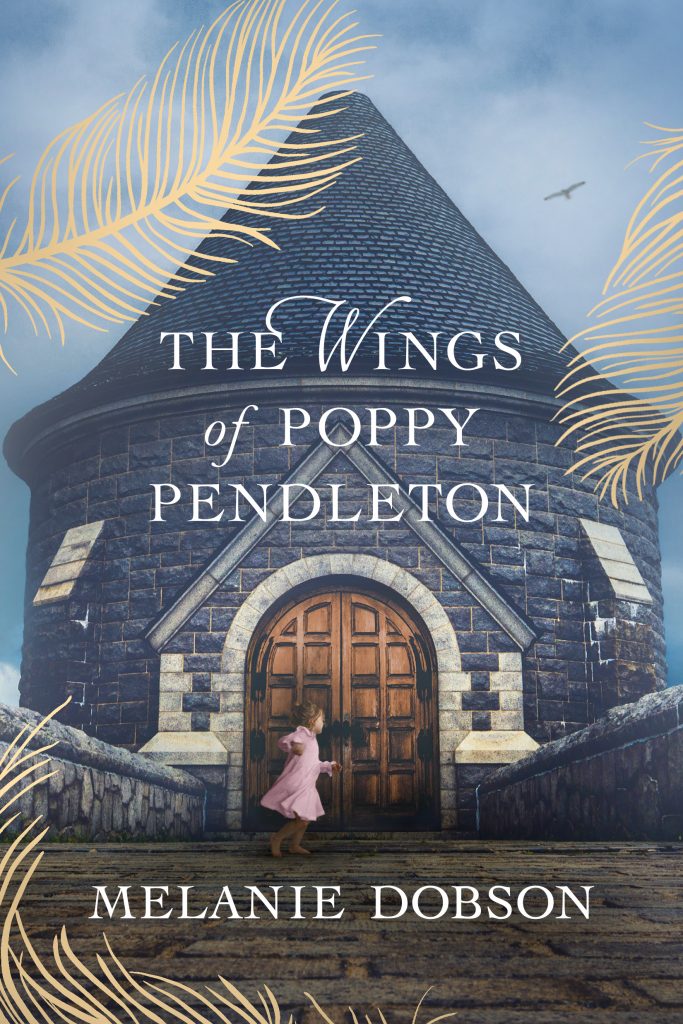
In the following discussion with Melanie Dobson, the author answers questions about her novel, The Wings of Poppy Pendleton.
What inspired this story?
The setting for The Wings of Poppy Pendleton was inspired by novels written by Susan Mathis and Ellen Potter. Even though I’ve spent a lot of time in New York, I had never before heard of the castles built along the St. Lawrence River. When I read their books, I fell in love with the mystery, beauty, and Gilded Age history from the Thousand Islands.
The main plotline in Poppy’s story was inspired by a recently discovered photograph of my grandpa and great-uncle as children. In this picture, my great-grandmother is holding a baby girl, and while my family is close, no one had ever told me about a great-aunt. I discovered that my great-grandparents adopted a girl in 1923, but sadly, they both died when she was young and none of my relatives knew what happened to her. As I began to unravel Marjory’s complicated journey, I decided to write a novel about another girl who went missing in the same era. A mystery that I could ultimately resolve through fiction.
What do you enjoy about time-slip narratives?
I have an innate desire to bring order to chaos and confusion, especially when it comes to finding out the truth about a past secret that impacts the well-being of future generations. In time-slip fiction, this unique challenge of delving into a difficult situation from the past leads to the pursuit of modern characters to find answers. My stories usually start with several different threads, and my desire is to weave them together in a way that brings hope and resolution for readers.
Describe the audience that you envisioned while writing this book. Who do you think will enjoy this book?
It’s really inspiring to hear of multiple generations—like a granddaughter, daughter, and mother—reading my novels together. While I have readers of different ages, both men and women, most of them seem to enjoy three specific things from the reading experience: They like multilayered, page-turning, entertaining novels. They enjoy learning about faith and history. And they want to grow or gain a new perspective through the books they read. I was intentional about trying to include each of these elements in Poppy’s story.
What messages or themes do you focus on in this story?
As someone who discovers my plot as I write, it’s often not until near the end of my first draft that I realize what my book is really about. I certainly grappled with consolidating my main theme as I wrote The Wings of Poppy Pendleton, but the story, I finally realized, is about the balance of appreciating and enjoying God’s creation and all that is good in our world without corrupting it. Other themes include restoration, the search for true joy, and not allowing the past to define our future.
The setting plays an important part in your story. What does the setting symbolize?
The St. Lawrence River is wild and mysterious, serene on a calm day and terrifying in a storm. This river is named after a Roman martyr who cared for the poor about two hundred years after Christ, and the immense boundary of water between Canada and the United States funnels the world’s largest reservoir of fresh water to the Atlantic. Underneath the often turbulent surface of the St. Lawrence is a graveyard of ships from centuries past, and the history, beauty, and unpredictable nature of this river symbolizes the tumultuous journey of my characters who need to find joy and peace in the midst of their personal storms. Characters who choose to search for unity in spite of division and ultimately take the shipwrecked pieces of their lives and create something meaningful from the debris.
How does your book address the present needs of your audience and the challenges in our culture?
Our world is filled with faux joy in the forms of overconsumption, consumerism, and endless streams of entertainment, but instead of satisfaction, these indulgences can lead to anxious minds and empty hearts. As a result, we often war within ourselves in the quest to obtain community, stability, and peace. This novel explores both sides of happiness—what is a temporary and unhealthy fix versus life-sustaining joy. While I sure don’t have all the answers, I hope Poppy’s story encourages readers to consider the source of true joy.
What do your readers love the most about your work?
I have the best reader friends! So encouraging in their notes and sharing of their own stories. Every novel I write is a glimpse of my own journey, and I hope readers can relate to the struggles of my characters even as they cling to beauty and restoration in the midst of really hard circumstances. The realities of broken relationships and then the possibilities of reconciliation are two things that readers seem to appreciate in my work. While they know things aren’t going to work out perfectly for every character, there will be redemption in the end.
What do you find to be the most challenging part of the writing process? What advice would you offer young writers?
I love researching a new story and dreaming up the characters and plot, but the writing portion of the writing process is, oddly enough, the most difficult part for me. Even though it’s hard, I love the challenge, and writing fiction is tremendously life-giving for me as it brings some order to all the messy ideas in my mind. Anne Lamott once said, “Perfectionism is the voice of the oppressor, the enemy of the people. It will keep you cramped and insane your whole life, and it is the main obstacle between you and a [bad] first draft.” My advice for new writers is to learn from the experts, analyze the structure of your genre, seek wise advice about how to improve your skills, and then write that first draft. It won’t be perfect but pour your story onto paper and then come back later to polish your words.
Which books and authors have shaped you most as a writer?
Emily Climbs by Lucy Maud Montgomery and Julie by Catherine Marshall encouraged me to pursue my dream of fiction writing in my early years, and as I grew older, I read books by authors like Jan Karon, Robin Lee Hatcher, Davis Bunn, Francine Rivers, Randy Alcorn, Linda Hall, and David Long that haunted me in the best sense of the word. I wanted to write like these men and women who communicated important spiritual truths through a compelling story.
About ten years into my career as a novelist, I read Sarah’s Key and was mesmerized by how Tatiana de Rosnay wove together dual timelines to create a complete and captivating plot. I spent months studying the time-slip structure and have enjoyed the challenge of weaving together the threads of multiple timelines ever since.
Do you have any new writing projects planned?
I’m constantly curating new ideas, but right now, I am actively working on two novels. The first is a fictionalized version of Hagar’s story in Genesis. I have learned an enormous amount about Old Testament culture in the past six months, and many of my preconceived notions have been turned on their head. I’m super excited to share this story of redemption with readers. The second book is my seventh time-slip novel with Tyndale House. This one will involve an old mansion in New York and an old book and . . . While my mind is deep in that story, I’m still working out the details. More to come soon!
You might be interested in
The Wings of Poppy Pendleton by Melanie Dobson
In this compelling new time-slip mystery, a little girl goes missing from her family’s castle in the Thousand Islands of New York. Eighty-five years later, a journalist teams up with a woman living on Koster Isle to find out what happened to Poppy, once and for all.
1907. On the eve of her fifth birthday, Poppy Pendleton is tucked safely in her bed, listening to her parents entertain New York’s gilded society in their Thousand Islands castle; the next morning, she is gone, and her father is found dead in his smoking room.
1992. Though Chloe Ridell lives in the shadows of Poppy’s castle, now in ruins, she has little interest in the mystery that still captivates tourists and locals alike. She is focused on preserving the island she inherited from her grandparents and reviving their vintage candy shop. Until the day a girl named Emma shows up on Chloe’s doorstep, with few possessions, save a tattered scrapbook that connects her to the Pendleton family. When a reporter arrives at Chloe’s store, asking questions about her grandfather, Chloe decides to help him dig into a past she’d thought best left buried. The haunting truth about Poppy, they soon discover, could save Emma’s life, so Chloe and Logan must work together to investigate exactly what happened long ago on Koster Isle.
“[A] propulsive time-swapping tale. . . . Fans of WWII inspirationals will love this.” Publishers Weekly on The Curator’s Daughter
“Readers will delight in this story that illustrates how the past can change the present.” Lisa Wingate, national bestselling author of Before We Were Yours, on Catching the Wind
- Standalone dual-timeline historical mystery
- Clean, suspenseful historical fiction, perfect for fans of Susan Meissner or Lisa Wingate
- Book length: 95,000 words
- Includes discussion questions for book groups
About the Author
Melanie Dobson is the award-winning author of twenty-five historical, time-slip, and romantic suspense novels. Five of her novels have won Carol Awards; Catching the Wind and Memories of Glass were nominated for a Christy Award in the historical fiction category; and Catching the Wind won an Audie Award in the inspirational fiction category. The Black Cloister, her novel about a religious cult, won the Foreword magazine Religious Fiction Book of the Year. Melanie is the previous corporate publicity manager at Focus on the Family, owner of the publicity firm Dobson Media Group, and an adjunct writing professor. When she isn’t working on her next novel, Melanie enjoys teaching a variety of workshops. Melanie and her husband, Jon, have two daughters. After moving numerous times with work, the Dobson family has settled near Portland, Oregon, and they love to hike and camp in the mountains of the Pacific Northwest and along the Pacific Coast.


